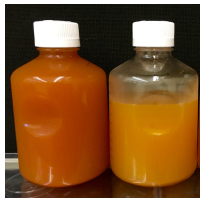Never-Before-Seen Bacteria Discovered in Depths of Fracking Wells
 Analysis of this fluid collected from fracking wells led to microbe discoveries (photo: Rebecca Daly, Ohio State University)
Analysis of this fluid collected from fracking wells led to microbe discoveries (photo: Rebecca Daly, Ohio State University)
By Philip A. Janquart, Courthouse News Service
(CN) — Researchers have discovered a never-before-seen genus of bacteria living in sustainable ecosystems in the most unlikely of places — in the depths of shale oil and gas fracking wells.
Hydraulic fracturing — fracking — is the process of using water and chemicals to fracture rock deep beneath the surface to extract resources such as oil and gas. The practice has become a source of controversy among environmentalists and others who say it destroys the environment and poisons humans.
But Ohio State University researchers and their colleagues reported in the Sept. 5 online edition of Nature Microbiology that they have found a new genus of bacteria that can survive fracking's hostile conditions. Dubbed Candidatus "Frackibacter," the bacteria was found among 31 other microbes in two fracturing wells drilled in different kinds of shale formations separated by hundreds of miles.
Interestingly, the wells are owned by different energy companies that use different fracturing techniques, according to a report published by Ohio State University's assistant director of research and innovation communications Pam Frost Gorder.
The microbes, excluding Frackibacter, are thought to have made their way from surface ponds used to fill the wells. Frackibacter was discovered by researchers taking a genomic approach to the study of microorganisms living in shale oil and gas wells.
"We think that the microbes in each well may form a self-sustaining ecosystem where they provide their own food sources," explained Kelly Wrighton, assistant professor of microbiology and biophysics at Ohio State. "Drilling the well and pumping in fracturing fluid creates the ecosystem, but the microbes adapt to their new environment in a way to sustain the system over long periods."
Wrighton says that while most of the microbes found in the wells likely come from the surface ponds, other bacteria and archaea may have already been living in the rock before drilling took place, including Frackibacter.
The bacteria are subject to high temperatures, pressure and most importantly salinity. The university's study points to a briny concoction of water, chemicals and salt that forces microorganisms to synthesize organic compounds called osmoprotectants to keep themselves from bursting. When the cells die, the osmoprotectants are released into the water where they are used by other microbes for food or protection.
"By examining the genomes of the different microbes, the researchers found that the osmoprotectants were being eaten by Halanaerobium and Candidatus Frackibacter," according to Gorder's Sept. 5 article. "In turn, these bacteria provided food for other microbes called methanogens, which ultimately produced methane."
And why does that matter?
Ohio State's researchers say conversion of osmoprotectants into methane could "possibly supplement the wells' energy output," but could make an even greater impact in the coal-bed methane industry.
"In coal-bed systems they've shown that they can facilitate microbial life and increase methane yields," Wrighton said. "As the system shifts over time to being less productive, the contribution of biogenic methane could become significantly higher in shale wells. We haven't gotten to that point yet, but it's a possibility."
In the meantime, research led by Ohio State assistant professor of earth sciences and microbiology Michael Wilkins is using genomics information to grow Candidatus Frackibacter in the lab, in part to take a closer look at its ability to survive high pressure and salinity, Gorder said.
To Learn More:
Microbial Metabolisms in a 2.5-km-Deep Ecosystem Created by Hydraulic Fracturing in Shales (by Rebecca A. Daly, Mikayla A. Borton, Michael J. Wilkins, David W. Hoyt, Duncan J. Kountz, Richard A. Wolfe, Susan A. Welch, Daniel N. Marcus, Ryan V. Trexler, Jean D. MacRae, Joseph A. Krzycki, David R. Cole, Paula J. Mouser and Kelly C. Wrighton, Nature Microbiology)
Fracking May Worsen Asthma in People Living Near Drilling Sites (by Lindsey Tanner, Associated Press)
Texas Family Wins First Jury Award for Health Damages from Fracking (by Noel Brinkerhoff, AllGov)
Fracking Companies Buy Silence of Families with Contaminated Water (by Noel Brinkerhoff, AllGov)
Is Fracking Contaminating U.S. Livestock? (by Matt Bewig, AllGov)
- Top Stories
- Unusual News
- Where is the Money Going?
- Controversies
- U.S. and the World
- Appointments and Resignations
- Latest News
- Trump Orders ICE and Border Patrol to Kill More Protestors
- Trump Renames National Football League National Trump League
- Trump to Stop Deportations If…
- Trump Denounces World Series
- What If China Invaded the United States?






Comments